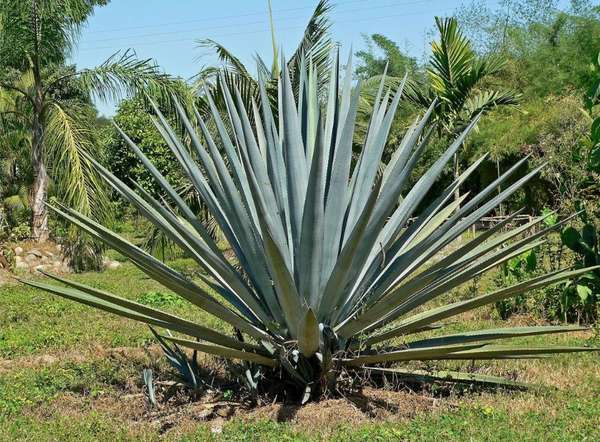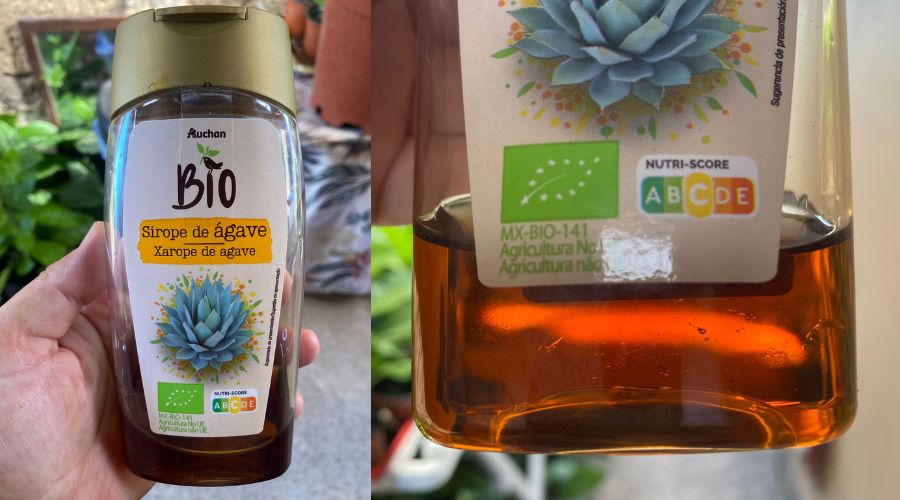Agave for Skincare: Vegan Honey Alternative & Benefits
I use agave in skincare and have been doing so for a while now.
How does agave in skincare stand out compared to contenders like honey or maple syrup?
- High Fructose Content (70-90%): Acting as a powerful moisture magnet, fructose ensures skin remains hydrated. With its abundant fructose, Agave excels in locking in moisture, setting it apart from other natural alternatives.
- Saponins: Agave is enriched with saponins, nature’s cleansers, which not only purify the skin but also gently exfoliate and offer antioxidant benefits. Additionally, these saponins lend a hand in warding off microbes, enhancing skin’s health.
Though honey and maple syrup come with their set of advantages, agave’s fructose-saponin duo positions it as an enticing choice, particularly for those veering towards vegan skincare.
So, even if you’re trading off certain perks from honey or maple syrup, agave brings to the table its unique skincare merits, making the switch worthwhile.
AFFILIATE COMMISSION DISCLAIMER: I may earn a commission from affiliate links in this article at no extra cost to you.
The Agave Solution for Skincare
As someone who’s spent years making and selling my own skincare, I’ve always been drawn to nature’s offerings.
And being from the Canary Islands, the agave is a special plant is woven into my memories.
As the trend towards vegan skincare grows, many are looking beyond honey for natural alternatives.

What is Agave Nectar?
Originating from the blue agave plant, agave nectar has long been appreciated for its natural sweetness. I personally love it.
At its core, agave nectar is rich in fructose (70-90%), which accounts for its distinct sweet taste.
Beyond these sugars, it also encompasses water and various other beneficial nutrients.

Agave vs. Honey vs. Maple Syrup for Skin
The sugars and enzymes present in sweeteners like honey, maple syrup, and agave nectar can deeply hydrate, exfoliate gently, and even offer antimicrobial benefits.
They work wonders as humectants, attracting moisture to the skin, and bestowing a glow that’s often elusive with artificial products.
- Natural sugars and enzymes offer hydration and gentle exfoliation.
- Act as humectants, drawing moisture to the skin.
- Provide a radiant glow that’s hard to achieve with synthetic products.
Honey has been the traditional choice in skincare
For the longest time, honey has reigned supreme in skincare, and I have even used the honey we collect here (not anymore).
Its power to combat bacteria and its luxurious texture have made it a staple in skincare and cosmetics. However, as I’ve gravitated towards veganism, honey no longer fits my personal philosophy.
This led me to discover the magic of agave nectar. It’s not just its vegan credentials that impress; its hydrating and calming properties make it a formidable rival to honey!
Agave vs Honey for Skincare
Consistency Differences: Agave nectar usually presents a runnier texture, blending seamlessly with other skincare components. In contrast, honey’s consistency can range from liquid to a more viscous state, influenced by its origin and treatment.
Sugary Details: While agave is rich in fructose, known for its moisture-retaining properties, honey boasts a mix of sugars, including glucose and fructose. This combination in honey also offers moisturising benefits, but the dominant fructose in agave gives it a unique hydration edge.
Natural Defenders: Honey’s claim to fame in skincare often revolves around its antimicrobial traits, ideal for those battling acne or skin inflammation. Agave possesses antimicrobial characteristics, but they might not be as pronounced as honey.
The Vegan Perspective: The crux of the matter for many is the vegan debate. Honey, being a bee byproduct, doesn’t fit the vegan bill. In contrast, agave, with its plant origins, aligns perfectly with vegan ideals.
Stability & Texture Over Time: Agave nectar maintains its texture consistently and boasts a commendable shelf life. Honey, however, can undergo crystallisation, though this can be reverted with a bit of warmth.
Nutrient Talk: Honey is peppered with vitamins, enzymes, and amino acids, all beneficial for skin vitality. Agave, while not as nutrient-packed as honey, still offers a soothing touch to the skin.
Sustainability Angle: Both agave and honey can be ethically sourced. But with growing concerns about bee welfare and their declining populations, some might view agave as a more planet-friendly option.
Agave vs Maple Syrup for Skincare
Texture & Feel: Typically, agave nectar boasts a smoother and more liquid-like texture than maple syrup, which tends to be on the denser side. This fluidity of agave makes blending it with other skincare ingredients a breeze.
Sugar Makeup: Both agave and maple syrup sweeten, but their sugar structures differ. Agave is rich in fructose, whereas maple syrup is a blend of sucrose, glucose, and fructose. The sugar type plays a role in the humectant qualities of the product, which is vital for skin hydration. Notably, the higher fructose content in agave might offer a more potent moisturising effect, given that sucrose doesn’t share the same humectant prowess.
Mineral Profile: Maple syrup is packed with minerals such as zinc, manganese, potassium, and calcium. These are undoubtedly beneficial, but they might not be ideal for all skincare concoctions, especially if you’re targeting a particular pH level or texture.
Vegan Factor: Agave nectar is a top pick for those crafting vegan skincare. Its texture and sugar composition often make it a more fitting choice than maple syrup in vegan formulations.
Longevity & Consistency: One of the perks of agave nectar is its extended shelf life. Unlike maple syrup, it remains consistent in formulations, which might undergo crystallisation or texture shifts over time.
Eco-friendliness: Both agave and maple syrup can be sourced sustainably. However, the resilience of the blue agave plant, especially in diverse climates, might tip the scales in its favour in terms of sustainability in certain areas.
As you can see, agave nectar shines as a promising alternative, bringing its own set of skincare advantages to the table!
Comparative Table Agave vs Honey vs Maple Syrup
| Aspect | Agave Nectar | Honey | Maple Syrup |
|---|---|---|---|
| Texture & Consistency | Smooth, Fluid | Varies (can be more viscous) | Denser |
| Sugar Profile | High in Fructose (excellent for hydration!) | Mix of Sugars: glucose, fructose, sucrose | Dominantly Sucrose |
| Natural Benefits | Antimicrobial, Hydrating | Strong Antimicrobial | – |
| Vegan Credentials | Vegan | Non-Vegan | Vegan |
| Stability | Stable, Long Shelf Life | Can Crystallise | Can Crystallise |
| Nutrient Content | Contains Saponins (beneficial for skin) | Vitamins, Enzymes | Rich in Minerals |
| Sustainability | Sustainable | Ethical Concerns with bees | Sustainable |
A note on of fructose (an excellent hydrator!):
- Agave Nectar: Typically contains about 70-90% fructose, though this can vary based on processing and the specific type of agave.
- Honey: Contains around 38-44% fructose, but this can vary depending on the floral source and other factors.
- Maple Syrup: Contains a much lower percentage of fructose, usually around 1-2%. The primary sugar in maple syrup is sucrose, which makes up about 60-70% of its sugar content.
While elevated fructose levels are great for skincare due to their moisture-retaining qualities, consuming too much fructose in our diet might not be the best for our health. That said, when we’re talking about skincare, agave’s rich fructose content is a definite plus for keeping skin hydrated.
Pros & Cons
- Saponins: Only agave has a notable content of saponins, meaning if you switch to honey or maple syrup, you might miss out on saponins’ cleansing and antioxidant benefits.
- Enzymes: Honey stands out regarding enzyme content, offering unique exfoliating and rejuvenating benefits. Agave has some enzymes, but maple syrup is lacking in this department.
- Antibacterial Properties: Honey’s natural antibacterial properties are unique and might not be as pronounced in agave or maple syrup.
- Minerals: Both honey and maple syrup have a richer mineral profile compared to agave. Minerals like zinc, manganese, and others in honey and maple syrup can be beneficial for skin health.
Benefits of Agave Nectar for Skin
So, what are we left with?
What does Agave ACTUALLY have in terms of benefits for the skin?
1. Fructose: An Excellent Hydrator
Agave has a higher fructose content compared to honey and maple syrup.
Fructose acts as an excellent humectant, which means it helps retain moisture, making it beneficial for skin hydration.
A study highlighted the potential of agave nectar in providing hydration, especially when compared to other nonnutritive sweeteners.
Benefits of fructose for skincare:
- Humectant Properties: Fructose naturally draws in and locks moisture, ensuring skin stays hydrated.
- Boosts Skin’s Suppleness and Softeness: With its hydrating effects, fructose contributes to a more pliant and elastic skin feel.
- Supports Skin Barrier: By promoting hydration, fructose helps fortify the skin’s natural defence barrier.
- Improves Skin Texture: Continuous hydration from fructose can result in a refined and even skin surface.
- Natural Ingredient: As a natural sugar derivative, fructose is a go-to in eco-friendly and pure skincare products.
2. Antioxidant & Soothing Properties (Saponins)
Agave contains saponins. Saponins are known for their antioxidant properties, ability to cleanse and exfoliate the skin, and can also help soothe inflammation.
While the specific antioxidant properties of agave nectar in skincare are still being explored, the importance of antioxidants in maintaining skin health is a well-established source.
3. Agave Does Contain Enzymes
Agave does contain enzymes, though not as varied or abundant as honey.
The specific enzymes in agave and their benefits for the skin haven’t been detailed as extensively as those in honey. Honey, for instance, contains glucose oxidase, which produces hydrogen peroxide, a known antiseptic.
4. Some Antibacterial Properties
Agave has some antibacterial properties, but they are not as pronounced as those in honey.
5. Mineral Content
Agave contains minerals like calcium, magnesium, potassium, and iron, which are derived from the soil where the agave plant grows.
However, its mineral content is not as rich as that of honey or maple syrup.
Agave nectar can help improve skin elasticity and firmness. The presence of natural sugars and enzymes can promote a tighter skin appearance.
The move towards vegan and plant-based alternatives in skincare is gaining momentum, and agave nectar stands out as a sustainable and ethical choice source.
Simple DIY Skincare Recipes Using Agave Syrup
1. Agave Moisturizing Face Mask
For those days when your skin feels like it’s been through a desert and back…
Skin Type: Suitable for dry to normal skin types.
Why It Works: Agave, with its high fructose content, acts as a natural humectant, drawing moisture to the skin. Oatmeal soothes and provides gentle exfoliation, while almond oil offers deep hydration and nourishment.
Ingredients:
- 1 tbsp agave syrup
- 1 tbsp oatmeal (ground)
- A few drops of almond oil
Instructions:
- Mix all ingredients in a bowl until you get a smooth paste.
- Slather it onto your face, imagining you’re a gourmet pancake.
- Leave the mask to work its magic for 15 minutes.
- Rinse with warm water and pat dry. Feel the softness!
How Often: Once a week for a hydration boost.
2. Agave Lip Scrub
Pucker up, buttercup! Get those lips mistletoe-ready!
Skin Type: For all lip types, especially those prone to chapping.
Why It Works: Agave syrup hydrates, brown sugar exfoliates away dead skin cells, and coconut oil moisturises and seals in the goodness.
Ingredients:
- 1 tsp agave syrup
- 1 tsp brown sugar
- 1 tsp coconut oil
Instructions:
- In a small bowl, mix the ingredients until well combined.
- Using your fingertip, apply the mixture onto your lips, scrubbing in gentle circles.
- Rinse (or lick!) off the excess and follow up with your favourite lip balm.
How Often: Twice a week or whenever your lips need some TLC.
3. Agave Soothing Body Lotion
Because your body deserves some syrupy love 🙂
Skin Type: Suitable for all skin types, especially those needing extra hydration.
Why It Works: Agave syrup enhances the moisturising properties of the lotion, and the optional lavender essential oil adds a calming scent, making your post-shower ritual even more relaxing.
Ingredients:
- 2 tbsp agave syrup
- 1 cup unscented organic and natural body lotion
- A few drops of lavender essential oil (optional, but recommended for that spa-like feel)
Instructions:
- In a mixing bowl, blend the agave syrup and essential oil into the body lotion.
- After showering, while your skin is still slightly damp, massage the lotion in. Feel it glide and absorb, leaving your skin silky smooth.
- Breathe in the soothing aroma and let your worries melt away.
How Often: Daily, because why not pamper yourself every day?
I Recommend Agave in The Raw Organic Agave Nextar/Syrup
My recommendation: Derived from Mexico’s blue agave plant, Agave In The Raw is a natural sweetener that offers a sweeter punch than regular sugar by about 25%. With its organic roots, this sweetener also boasts gluten-free, kosher, vegan, and Non-GMO credentials
Conclusion
Navigating the world of natural skincare, agave nectar shines brightly, especially for those committed to vegan choices. Its distinctive blend of fructose and saponins provides both moisture and calming effects, making it a worthy contender against long-standing favourites like honey. Our exploration into its advantages and the DIY concoctions we’ve crafted highlight agave’s potential in vegan skincare.
Yet, it’s essential to bear in mind that our skin is as individual as our personalities. Before fully embracing agave in your skincare regime, it’s wise to do a patch test. This step ensures compatibility and helps sidestep potential adverse reactions.
To wrap up, the skincare landscape is vast and varied, but agave nectar has carved its niche, particularly for those on the hunt for botanical alternatives. Its promise is clear, but as with all things skincare, it’s best to proceed with a mix of knowledge, prudence, and a sprinkle of enthusiasm. Skincare, after all, is a journey of both care and discovery.
FAQs
Can I put agave on my face?
Yes, agave is suitable for facial application, particularly when incorporated into skincare recipes. Its rich fructose levels make it an effective moisturiser, attracting and retaining moisture for the skin. But, as always, with new skincare products, it’s wise to do a patch test first to check for any sensitivities. Here’s research on hyaluronic acid, which is a humectant like agave, meaning they can attract and retain moisture. Resource
Is agave better than honey for skin?
Agave and honey each bring unique advantages to skincare. With its rich fructose levels, agave serves as a potent hydrator, whereas honey’s natural antimicrobial traits can be a boon for those with acne concerns. Deciding between them often hinges on individual skincare objectives and ethical choices. For vegan skincare enthusiasts, agave stands out as the go-to option.. Resource
Does agave help acne?
Agave is enriched with saponins that exhibit antimicrobial traits. Though it might provide a level of defense against bacteria that trigger acne, it doesn’t match the robust antimicrobial action of honey. That said, its ability to retain moisture can be beneficial for skin types prone to acne breakouts.
What are the benefits of agave?
Agave provides a range of skin advantages, such as moisturising effects from its rich fructose levels, gentle exfoliation and cleansing courtesy of its saponins, and some potential for combating microbes. Additionally, for those seeking plant-based skincare options, agave stands out as a commendable substitute to honey.
What are the pros and cons of agave?
FOR SKIN:
Pros:
- High fructose content for superior moisturisation.
- Contains saponins for mild cleansing.
- Vegan alternative to honey.
Cons:
- Not as nutrient-rich as honey.
- Might not have as pronounced antimicrobial properties as honey.
FOR HEALTH:
Pros:
- Low Glycemic Index: Releases glucose slowly, aiding in blood sugar control.
- Potent Sweetness: Often sweeter than sugar, so less is needed.
- Easy Mix: Dissolves quickly in cold drinks.
- Plant-Based: A vegan-friendly alternative to honey.
- Durable: Long-lasting without crystallising.
Cons:
- Fructose Levels: Contains high fructose, which can be taxing on the liver when consumed in large amounts.
- Manufacturing: Often heavily processed, potentially reducing its health benefits.
- Calories: Similar calorie count to sugar.
- Pricey: It can be costlier than other sweeteners.
- Eco Impact: Rising demand can lead to less sustainable farming practices.
Can I use agave instead of honey for face mask?
Yes! Agave effectively replaces honey in facial masks, particularly for those leaning towards vegan options. Its consistency and hydrating qualities align well with diverse skincare recipes. See my recipes above.

